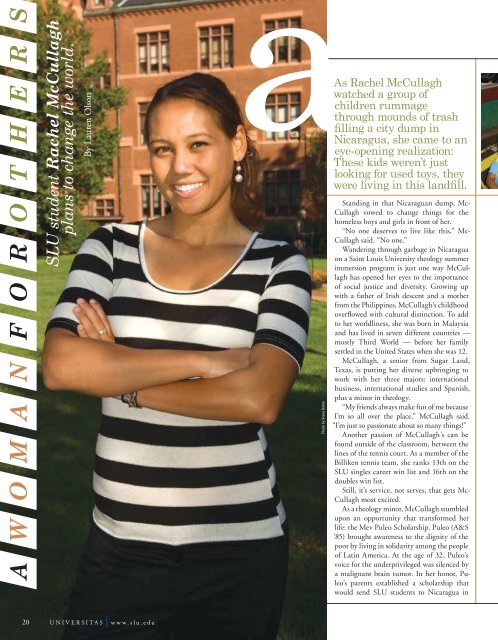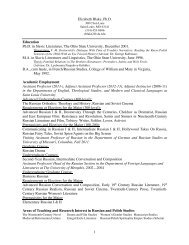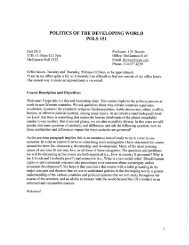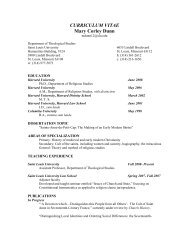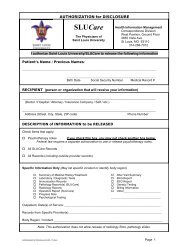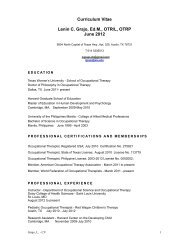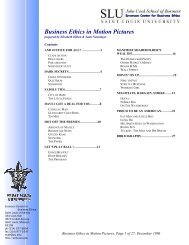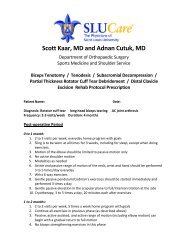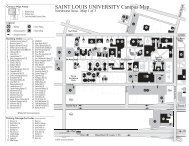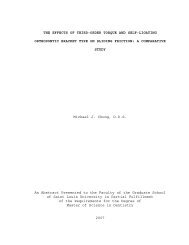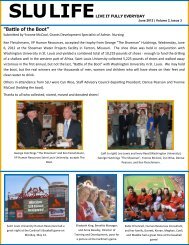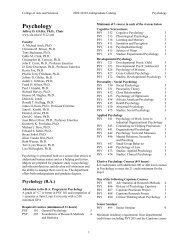Celebrating Father Biondi's Anniversary - Saint Louis University
Celebrating Father Biondi's Anniversary - Saint Louis University
Celebrating Father Biondi's Anniversary - Saint Louis University
You also want an ePaper? Increase the reach of your titles
YUMPU automatically turns print PDFs into web optimized ePapers that Google loves.
SLU student Rachel McCullagh<br />
plans to change the world.<br />
– By Lauren Olson<br />
20 UNIVERSITAS www.slu.edu<br />
Photo by Steve Dolan<br />
As Rachel McCullagh<br />
watched a group of<br />
children rummage<br />
through mounds of trash<br />
filling a city dump in<br />
Nicaragua, she came to an<br />
eye-opening realization:<br />
These kids weren’t just<br />
looking for used toys, they<br />
were living in this landfill.<br />
Standing in that Nicaraguan dump, Mc-<br />
Cullagh vowed to change things for the<br />
homeless boys and girls in front of her.<br />
“No one deserves to live like this,” Mc-<br />
Cullagh said. “No one.”<br />
Wandering through garbage in Nicaragua<br />
on a <strong>Saint</strong> <strong>Louis</strong> <strong>University</strong> theology summer<br />
immersion program is just one way McCullagh<br />
has opened her eyes to the importance<br />
of social justice and diversity. Growing up<br />
with a father of Irish descent and a mother<br />
from the Philippines, McCullagh’s childhood<br />
overflowed with cultural distinction. To add<br />
to her worldliness, she was born in Malaysia<br />
and has lived in seven different countries —<br />
mostly Third World — before her family<br />
settled in the United States when she was 12.<br />
McCullagh, a senior from Sugar Land,<br />
Texas, is putting her diverse upbringing to<br />
work with her three majors: international<br />
business, international studies and Spanish,<br />
plus a minor in theology.<br />
“My friends always make fun of me because<br />
I’m so all over the place,” McCullagh said.<br />
“I’m just so passionate about so many things!”<br />
Another passion of McCullagh’s can be<br />
found outside of the classroom, between the<br />
lines of the tennis court. As a member of the<br />
Billiken tennis team, she ranks 13th on the<br />
SLU singles career win list and 16th on the<br />
doubles win list.<br />
Still, it’s service, not serves, that gets Mc-<br />
Cullagh most excited.<br />
As a theology minor, McCullagh stumbled<br />
upon an opportunity that transformed her<br />
life: the Mev Puleo Scholarship. Puleo (A&S<br />
’85) brought awareness to the dignity of the<br />
poor by living in solidarity among the people<br />
of Latin America. At the age of 32, Puleo’s<br />
voice for the underprivileged was silenced by<br />
a malignant brain tumor. In her honor, Puleo’s<br />
parents established a scholarship that<br />
would send SLU students to Nicaragua in<br />
hopes that recipients would become advocates for social justice.<br />
With the scholarship and her acquired classroom knowledge about<br />
what it means to be a woman for others, McCullagh was prepared to<br />
fulfill the hopes of the Puleo family.<br />
Summer in Nicaragua<br />
Voluntarily leaving behind the comforts of the United States, Mc-<br />
Cullagh immersed herself in the Nicaraguan culture for two months<br />
this summer. She lived with a family of eight in a small house that<br />
had no air conditioning or running water. Every morning she woke<br />
up, sweat dripping down her back and bugs crawling on the floor.<br />
Every day she ate a bowl of rice and beans for breakfast, lunch and<br />
dinner.<br />
“You learn the most by living someone else’s life — by putting<br />
yourself in someone else’s shoes,” McCullagh said.<br />
Lacing up a pair of her own shoes every morning at 5:30 a.m., McCullagh<br />
began her daily routine with a jog along a dirt path through the city.<br />
By 7:30 a.m. she was taking a 15-cent bus ride to work in one of the most<br />
dangerous neighborhoods outside of Managua, the capital of Nicaragua.<br />
McCullagh spent her mornings working with a group of children,<br />
ages 2 through 10, at a tutoring program. In addition to teaching<br />
basic letters and numbers, she was in charge of feeding the children,<br />
most of whom were malnourished. She was often handed a 10-pound<br />
bag of rice with the task of removing anything that moved.<br />
“I picked out animals, anything from small mice to one-inch ants,”<br />
McCullagh said. “I thought, ‘I can’t cook this food for these kids.’ But<br />
they don’t have anything else. They have to eat it.”<br />
McCullagh was experiencing everything a Third World country<br />
had to offer, both the good and bad, when her Nicaraguan routine<br />
was drastically interrupted.<br />
After treating her host family to dinner at a restaurant with a $20<br />
bill, which would have been enough to feed that family for a week, a<br />
queasiness came over McCullagh. Things took a turn for the worse<br />
the following morning, as she passed out at church and awoke in<br />
the hospital. Diagnosed with an intestinal and urinary tract infection<br />
caused by parasites in the food or water, she was given antibiotics and<br />
sent back to her host family.<br />
“I realized how lucky I was that I had enough money to go to the<br />
hospital,” she said. “If I were a Nicaraguan, I couldn’t have done that.”<br />
Through her illness, McCullagh learned the true meaning of dependence.<br />
“I’ve never been in a state where I couldn’t take care of myself,” Mc-<br />
Cullagh recalled. “I would sit up in bed and get sick all over the floor,<br />
MCCULLAgH’S PHOTOS FrOM Her SUMMer in niCArAgUA.<br />
and my host mother would clean it up. This lady had nothing. She<br />
stood over me, held me and fanned me with a piece of paper just to<br />
make me feel a little bit better.<br />
“They don’t have much to give, but everything they have, they’re<br />
just so happy to give to you.”<br />
Out of concern, McCullagh’s father flew to Nicaragua with the<br />
intent of returning to America with his only daughter. With three<br />
weeks of the trip left, McCullagh was faced with a difficult decision:<br />
return to the States for a proper recovery or struggle through her illness<br />
and complete her mission to help Nicaraguans in need.<br />
“I really wanted to finish my experience. My parents really wanted<br />
me to come home,” McCullagh said.<br />
“I decided to stay.”<br />
A New Perspective<br />
In the end, McCullagh’s decision to finish what she started gave her<br />
a new perspective.<br />
After two months in a Third World country, McCullagh still describes<br />
herself as passionate, but now, she said, with a healthy dose of<br />
practicality. Some advocates of social justice strive to make a difference<br />
through protests, grassroots organizations or the Peace Corps.<br />
McCullagh has a different path in mind. She hopes to use her SLU<br />
John Cook School of Business degree to initiate economic change<br />
across the globe.<br />
“The problem with Nicaragua is that they have no way to make<br />
money, except sweatshops,” she said. “They have no oil, poor leadership<br />
and few exports.”<br />
Inspired by her SLU education and her summer abroad, McCullagh<br />
feels a newfound obligation to solve that problem.<br />
“If you want to actually make change, you need a profession,” she<br />
said. “Volunteering is great, but having the tools to make a difference<br />
is key.”<br />
By working to support initiatives such as NAFTA (North American<br />
Free Trade Agreement) or CAFTA (Central American Free Trade<br />
Agreement), McCullagh believes she can pioneer policy change and<br />
improve the standard of living in Third World countries.<br />
Walking along the dirt roads and through the city dump of Nicaragua,<br />
McCullagh made a promise to herself and to humanity that just<br />
might change the future:<br />
“No one should live without running water or electricity,” she said.<br />
“That should be a standard.<br />
“No one should live in a trash dump. That should be a standard.”<br />
If McCullagh has anything to say about it, it will.<br />
UNIVERSITAS FALL 2007<br />
21


